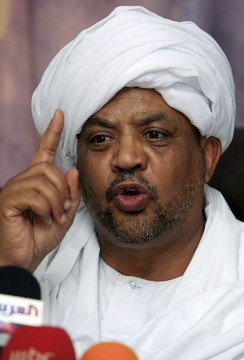PCP distances itself from remarks on reconciliation with Sudan’s ruling party
August 18, 2013 (KHARTOUM) – Sudan’s opposition Popular Congress Party (PCP) has described statements made this week by one of its key officials on reconciliation with the ruling National Congress Party (NCP) after more than a decade of a bitter power struggle.

Al-Sanoosi appeared alongside the IM Secretary General and NCP’s leading figure, Al-Zubair Ahmed Al-Hassan, and they both called for the unity of the Sudanese Islamists in order to confront what they called the “secularists and the infiltrators”.
The PCP’s secretary general, Kamal Omer, described Al-Sanoosi remarks as personal that they don’t represent the official stance of the party’s institutions.
Omer emphasized that the PCP is not ready to sacrifice the sympathy which it gained among Sudanese people following the 1999 fallout between Bashir and PCP leader Hassan al-Turabi. The latter was ousted from his post as parliament speaker.
Al-Turabi afterwards established the PCP and has since been a vociferous critic of the very regime whose army-backed seizure of power in 1989 he orchestrated.
Omer also lambasted al-Zubair and said that he failed in all government posts which he held including the Finance and Oil ministries, accusing him of fraudulently wining the position of the IM secretary general.
He further described Al-Zubair as a non-reformist figure, saying that he does not even take part in the decision-making process within the NCP.
The PCP official also harshly criticized the NCP leading figure, Abdel-Rahim Ali, describing him as someone who sits “on the sidewalk”, adding that he holds extremist views against the leftist and secular forces and thinks that they should be killed.
Ali said in press statements on Sunday that the unity between Turabi and Bashir is possible and pointed out that what happened in Egypt renewed the feeling that the Islamic bloc is targeted , noting that the time lapse since the split is enough to overcome the negative feelings and mistrust.
The official, who headed the NCP Shura (consultative) council for several years, was also the head of the committee entrusted with healing the rift between the Islamists when the split took place in 1999.
Omer said that his party would push ahead with the opposition alliance in order to topple the regime, adding that the PCP would accept secularists rule if they took over power through legal means.
He stressed that the current political crisis in Egypt would not impact the PCP relations opposition parties, calling upon the NCP to declare a clear stance on the events there.
“We told our party members who took part in the demonstration in front of the Egyptian embassy to go to “Pharaoh, indeed, he has transgressed”, not to talk about the unity of the Islamists in Sudan”, Omer added.
He saw that rapprochement among the Islamists became impossible because the gap between the two parties has widened, saying that the NCP doesn’t believe in freedom and continues to distort the federal system which led to fueling tribal conflicts in Darfur.
The PCP Deputy Secretary General for political affairs, Al-Amin Abdel-Razig, for his part, said that the opposition has prepared the democratic alternative program and the new constitution, pointing that the two documents have addressed the question of how Sudan should be governed not who should govern the Sudan.
He downplayed the initiative of Sudan’s 2nd Vice President, Al-Hag Adam, to unite the two parties and said that he met with Turabi without having the adequate mandate from the NCP, claiming that Adam admitted to Darfur MPs in the National Assembly that he does not have the sweeping powers to perform his duties.
Abdel-Razig also said that the presidential assistant, Abdel-Rahman Al-Mahdi, also does not have any powers and that he only performs protocol and ceremonial functions.
He also downplayed the spread of secularism among Sudanese people saying that it is not deeply rooted in Sudan, predicting that the PCP would be the largest political party following the downfall of the current regime.
(ST)
